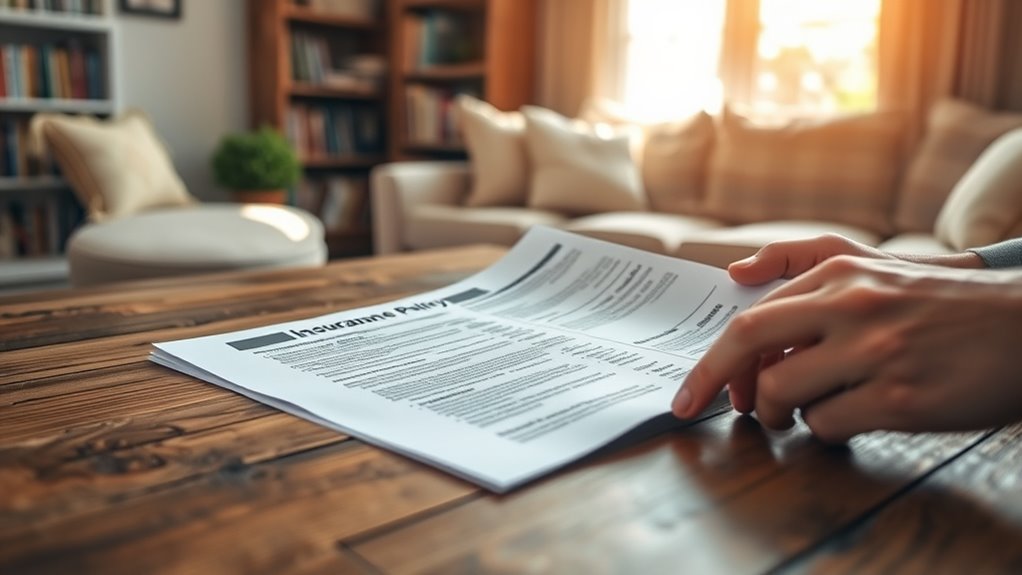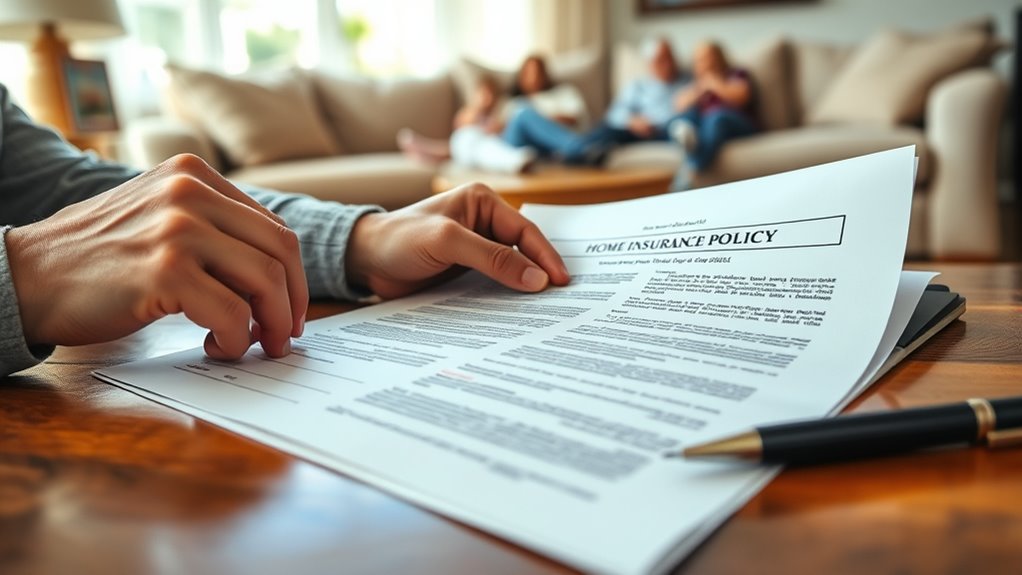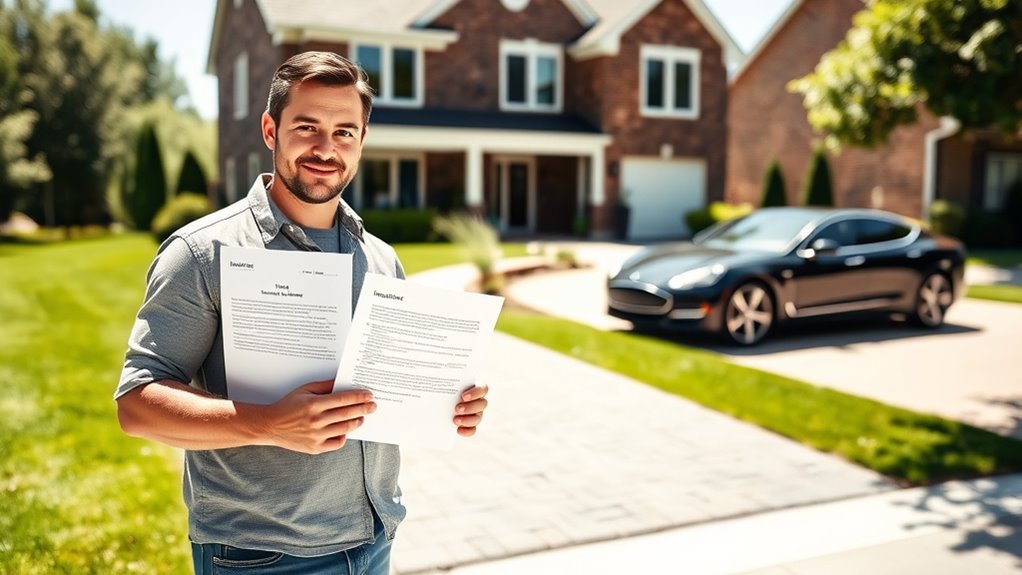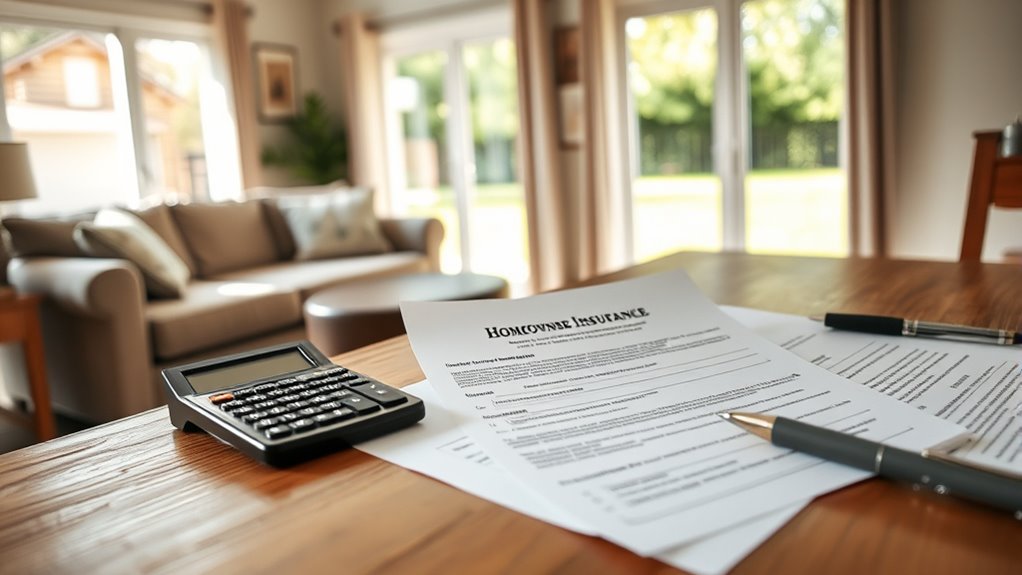Homeowner insurance covers damages from fire, storms, theft, and liability if someone gets hurt on your property. To determine the right coverage, assess your home’s rebuilding costs and consider local risks, discounts, and updates needed. Be aware of exclusions like floods or earthquakes, and know how liability insurance safeguards your finances if you cause harm. If damage occurs, document everything and notify your insurer promptly. Keep character, proof, and regulations in mind for proper protection—more details await your discovery.
Key Takeaways
- Homeowner insurance covers damages from fire, theft, storms, and liability for injuries or property damage to others.
- Evaluate property value based on rebuild costs and update policies regularly to ensure adequate coverage.
- Additional policies are often needed for floods, earthquakes, or high-value items not covered in standard plans.
- Proper incident documentation, including photos and detailed records, is essential for efficient claims and liability management.
- Understanding legal requirements and safety measures can reduce premiums and help meet lender and local regulations.
What Does Homeowner’s Insurance Cover?

Homeowner’s insurance provides financial protection against unforeseen events that can damage your property or lead to liability claims. Typically, it covers damage caused by fire, vandalism, and storms, helping you repair or replace your home and belongings. If a theft occurs, your policy can reimburse you for stolen items. Additionally, liability coverage protects you if someone gets injured on your property or if you accidentally damage someone else’s property. Most policies also include living expenses if you’re temporarily unable to stay in your home due to covered damages. It’s important to review your policy details, as coverage can vary. Knowing what’s included helps you prepare for unexpected situations and ensures you’re adequately protected against common risks. Understanding your coverage’s contrast ratio can help you better assess the overall protection of your home and belongings.
How Can I Determine the Right Coverage for My Home?

To find the right coverage, start by evaluating your property’s value so you know what it’s worth. Think about your personal risks, like natural disasters or theft, that might require extra protection. This way, you can choose a policy that truly fits your home’s needs and your financial security. Additionally, reviewing your insurance and liability options regularly ensures your coverage stays aligned with any changes in your circumstances or laws.
Assess Property Value
Determining the right coverage for your home starts with accurately evaluating its value. You need to understand what it would cost to rebuild your home from the ground up, not just its market price. This involves considering construction costs, materials, and labor rates. Use the following table to compare factors influencing your home’s value:
| Factor | Impact on Property Value |
|---|---|
| Replacement Costs | Determines coverage needed for rebuilding |
| Market Value | Influences insured amount but isn’t the same |
| Home Size & Features | Larger or upgraded homes typically cost more |
| Location & Local Rates | Affects rebuilding costs and insurance premiums |
Additionally, understanding the signs of spoilage in lemon juice can help ensure your ingredients remain fresh for home cooking and juicing.
Consider Personal Risks
Evaluating your property’s value is just the first step; understanding your personal risks helps guarantee your coverage matches your specific needs. Consider factors like your neighborhood’s crime rate, local weather patterns, and your household’s unique vulnerabilities. Do you have expensive jewelry, artwork, or collectibles? You might need extra coverage for those items. If you have teenagers or frequent visitors, liability risks increase, so you may want higher liability limits. Think about your health and safety concerns—if you or family members have special needs, additional coverage could be necessary. Assess potential risks like flooding, earthquakes, or fires that aren’t covered under standard policies. Additionally, knowing the horsepower of your electric bikes can help you understand the potential risks associated with faster speeds and more powerful components. By identifying these personal risks, you ensure your policy provides extensive protection tailored to your home and lifestyle.
What Are Common Exclusions in Home Insurance Policies?

Many home insurance policies have specific exclusions that homeowners should be aware of, as these can limit coverage in certain situations. Knowing these exclusions helps you avoid surprises when filing a claim. Common exclusions often include damages caused by floods, earthquakes, or sewer backups, which usually require separate policies. Additionally, intentionally caused damage, neglect, or wear and tear are typically not covered. You also won’t find coverage for certain high-value items like jewelry or artwork unless you add specialty coverage. Finally, damages resulting from illegal activities or pests like termites are excluded. Being aware of these exclusions allows you to better understand your policy limits and consider additional coverage options if needed. For example, understanding the importance of emotional support can help you cope with the stress related to insurance claims and home repairs. This knowledge helps you protect your home more effectively.
How Does Liability Insurance Protect Me?

Liability insurance protects you by covering the costs if someone gets injured on your property or if you accidentally cause damage to someone else’s belongings. If a visitor slips and falls, liability coverage can pay for their medical bills and legal expenses if they sue. Similarly, if you accidentally damage a neighbor’s fence or roof, your insurance helps cover repairs or replacement costs. This protection prevents you from having to pay out-of-pocket for costly legal claims or damages that could otherwise drain your finances. It provides peace of mind, knowing that unexpected incidents won’t leave you financially vulnerable. Remember, liability insurance is a key part of an all-encompassing homeowner policy, safeguarding your assets and protecting you from the financial impact of accidents or damages caused by you or your family.
What Should I Do If I Damage Someone Else’s Property?

If you damage someone else’s property, act quickly to prevent further harm and assess the situation. Make sure to report the incident to your insurance company and gather clear documentation, including photos and details of what happened. Being prompt and thorough helps protect you and ensures the claim process goes smoothly. Additionally, understanding your insurance coverage can help you navigate potential claims more effectively.
Immediate Incident Response
What’s the first step if you accidentally damage someone else’s property? Immediately assess the situation to guarantee everyone’s safety. If someone is injured or if there’s a fire or leak, call emergency services right away. Next, take clear photos of the damage for documentation. Offer a sincere apology to the property owner and discuss how to address the damage. Stay calm and cooperative, avoiding arguments. Remember to:
- Secure the scene to prevent further damage
- Gather contact information from the property owner
- Avoid admitting fault or making promises about payment
- Refrain from moving or altering damaged items unnecessarily
- Keep a record of all conversations and actions taken
- Understanding city dynamics can help you navigate local resources and ensure a smoother resolution process.
Reporting and Documentation
When you accidentally damage someone else’s property, prompt and thorough reporting is vital. Contact the property owner immediately, explain what happened, and express your willingness to resolve the issue. Take clear photos of the damage from multiple angles to document the situation objectively. Keep detailed notes about the incident, including date, time, location, and circumstances leading up to the damage. If you’re filing an insurance claim, provide all requested information accurately and promptly. Maintain copies of all correspondence, receipts, and photos related to the incident. Proper documentation helps ensure a smooth claims process and demonstrates your responsibility. Being proactive and transparent can also help maintain goodwill and prevent misunderstandings. Your thorough reporting protects both your interests and those of the property owner. Additionally, understanding homeowner insurance coverage can help you better manage liability and protect your assets in such situations.
Are There Specific Insurance Requirements After Purchasing a Home?

After purchasing a home, you’ll need to guarantee your insurance coverage meets any specific requirements set by your lender or local regulations. These requirements ensure your property is protected and that you’re compliant with legal standards. Typically, lenders require you to carry a minimum amount of homeowner’s insurance, often covering the mortgage amount. You might also need to include specific endorsements or riders for certain risks. Local laws could mandate coverage for natural disasters common in your area. Failing to meet these requirements can delay closing or cause issues if you need to file a claim. Be sure to review your lender’s instructions and local regulations carefully. Additionally, understanding low light office plants can help maintain a healthy environment in your home or workspace.
How Can I Reduce My Home Insurance Premiums?

Once you’ve met your insurance requirements after purchasing your home, you might wonder how to lower your premiums. You can start by increasing your deductible, which reduces your premium cost—just make certain you can afford the higher out-of-pocket expense if needed. Installing safety features like smoke detectors, security systems, and fire-resistant roofing can also earn you discounts. Maintaining good credit can positively impact your premium, as insurers often consider credit scores in their calculations. Bundling your home insurance with other policies, such as auto insurance, can lead to savings. Additionally, regularly reviewing and updating your policy to reflect changes in your home or lifestyle ensures you’re not overpaying. Being aware of newborn safety guidelines can help you prevent accidents and reduce liability risks associated with your property. These steps can help lower your premiums without sacrificing essential coverage.
Frequently Asked Questions
How Does Flooding or Natural Disaster Coverage Work in Homeowner’s Insurance?
Flooding or natural disaster coverage typically isn’t included in standard homeowner’s insurance policies. You need to purchase a separate flood insurance policy through the National Flood Insurance Program (NFIP) or private insurers. This coverage helps pay for damage caused by floods, hurricanes, or earthquakes. Make sure to review your policy details carefully, as coverage limits and exclusions vary. Protect your home by understanding what’s covered and securing appropriate insurance.
Can I Customize My Liability Coverage Limits?
Absolutely, you can customize your liability coverage limits to fit your needs. Think of it as tailoring a suit—adjusting the fit to guarantee you’re protected without paying for extras you don’t need. Contact your insurer to discuss options like increasing limits or adding specific protections. By doing so, you ensure your coverage matches your lifestyle, giving you peace of mind like a well-fitted suit that feels just right.
What Records Should I Keep for Insurance Claims?
You should keep detailed records of any incidents, repairs, and communications related to your claim. Save receipts, invoices, photos, and videos of damages, as well as police reports if applicable. Document conversations with your insurance company, including dates, times, and the names of representatives. Maintaining organized files guarantees you have evidence to support your claim, speeds up the process, and helps prevent disputes or delays in settlement.
How Does Tenant or Renter Liability Affect Homeowner Policies?
Your renter’s liability can dramatically impact your homeowner policy, sometimes more than you’d imagine. If your tenant causes damage or injury, your policy might cover their actions depending on your coverage specifics. It’s essential to clarify your policy details and guarantee you have adequate liability protection. Regularly review your coverage, communicate with your insurer, and consider adding extra liability protection if your renters’ activities pose high risks to avoid surprises.
Are There Discounts for Installing Security Systems?
Yes, installing security systems can often earn you discounts on your homeowner’s insurance. Insurance providers see security systems as reducing the risk of theft or damage, which benefits both parties. To take advantage, make sure to inform your insurer about your system and provide any necessary documentation. Keep in mind, discounts vary by company, so it’s a good idea to compare offers and confirm your savings before installing a new security setup.
Conclusion
Don’t assume insurance is a hassle or unnecessary expense. By understanding your coverage options and liability protections, you can confidently safeguard your home and assets. While it might seem complicated at first, taking the time to educate yourself can save you money and stress later. Remember, investing in the right insurance isn’t just about compliance—it’s about peace of mind. So, don’t wait until it’s too late—get informed and secure your home today.









